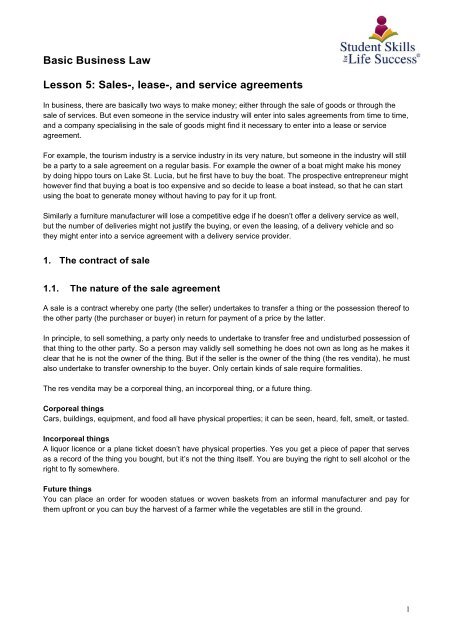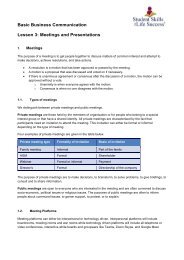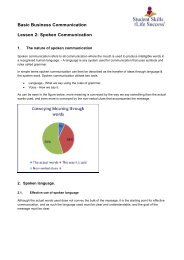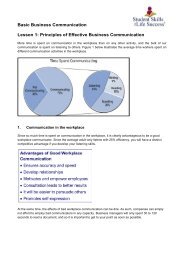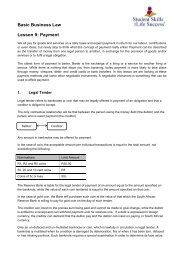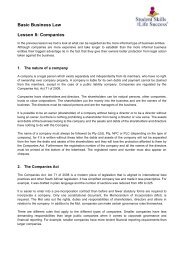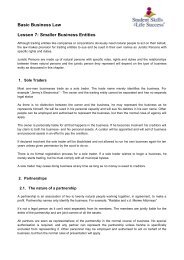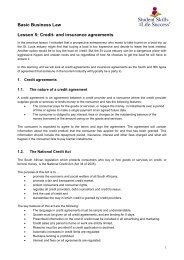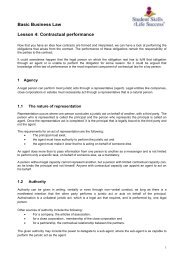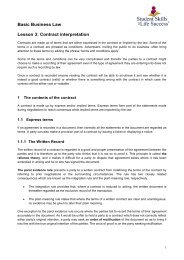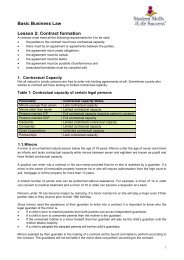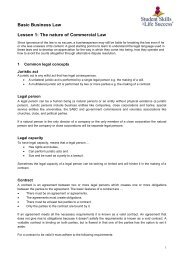Basic Business Law. Lesson 5. Sales', lease-, and service agreements
This is the fifth lesson of the "Student Skills for Life Success" "Basic Business Law" course. The topics covered in this booklet are: 1. The contract of sale 2. Lease agreements 3. Service agreements
This is the fifth lesson of the "Student Skills for Life Success" "Basic Business Law" course. The topics covered in this booklet are:
1. The contract of sale
2. Lease agreements
3. Service agreements
Create successful ePaper yourself
Turn your PDF publications into a flip-book with our unique Google optimized e-Paper software.
<strong>Basic</strong> <strong>Business</strong> <strong>Law</strong><br />
<strong>Lesson</strong> 5: Sales-, <strong>lease</strong>-, <strong>and</strong> <strong>service</strong> <strong>agreements</strong><br />
In business, there are basically two ways to make money; either through the sale of goods or through the<br />
sale of <strong>service</strong>s. But even someone in the <strong>service</strong> industry will enter into sales <strong>agreements</strong> from time to time,<br />
<strong>and</strong> a company specialising in the sale of goods might find it necessary to enter into a <strong>lease</strong> or <strong>service</strong><br />
agreement.<br />
For example, the tourism industry is a <strong>service</strong> industry in its very nature, but someone in the industry will still<br />
be a party to a sale agreement on a regular basis. For example the owner of a boat might make his money<br />
by doing hippo tours on Lake St. Lucia, but he first have to buy the boat. The prospective entrepreneur might<br />
however find that buying a boat is too expensive <strong>and</strong> so decide to <strong>lease</strong> a boat instead, so that he can start<br />
using the boat to generate money without having to pay for it up front.<br />
Similarly a furniture manufacturer will lose a competitive edge if he doesn’t offer a delivery <strong>service</strong> as well,<br />
but the number of deliveries might not justify the buying, or even the leasing, of a delivery vehicle <strong>and</strong> so<br />
they might enter into a <strong>service</strong> agreement with a delivery <strong>service</strong> provider.<br />
1. The contract of sale<br />
1.1. The nature of the sale agreement<br />
A sale is a contract whereby one party (the seller) undertakes to transfer a thing or the possession thereof to<br />
the other party (the purchaser or buyer) in return for payment of a price by the latter.<br />
In principle, to sell something, a party only needs to undertake to transfer free <strong>and</strong> undisturbed possession of<br />
that thing to the other party. So a person may validly sell something he does not own as long as he makes it<br />
clear that he is not the owner of the thing. But if the seller is the owner of the thing (the res vendita), he must<br />
also undertake to transfer ownership to the buyer. Only certain kinds of sale require formalities.<br />
The res vendita may be a corporeal thing, an incorporeal thing, or a future thing.<br />
Corporeal things<br />
Cars, buildings, equipment, <strong>and</strong> food all have physical properties; it can be seen, heard, felt, smelt, or tasted.<br />
Incorporeal things<br />
A liquor licence or a plane ticket doesn’t have physical properties. Yes you get a piece of paper that serves<br />
as a record of the thing you bought, but it’s not the thing itself. You are buying the right to sell alcohol or the<br />
right to fly somewhere.<br />
Future things<br />
You can place an order for wooden statues or woven baskets from an informal manufacturer <strong>and</strong> pay for<br />
them upfront or you can buy the harvest of a farmer while the vegetables are still in the ground.<br />
1
The price agreed upon must have a monetary component for the contract to qualify<br />
as a sale, but need not be entirely in money. For example, the buyer of a motor car<br />
may agree to trade in his present motor vehicle as part payment of the price.<br />
The price must be a fixed amount, or the parties must have agreed upon some external method or st<strong>and</strong>ard<br />
to make the price fixable. For example, you can agree to pay an informal manufacturer at cost plus 50%.<br />
1.2. Types of Sale<br />
Cost Insurance Freight (CIF) sales<br />
A CIF sale is one in which the seller must ship <strong>and</strong> insure the goods. He must then invoice the purchaser for<br />
a sum which includes the price of the goods, the cost of the insurance <strong>and</strong> the cost of shipping the goods to<br />
their destination<br />
On tender of the shipping documents to the buyer, the seller is entitled to payment, even if the goods are<br />
damaged, lost or destroyed. The seller is not obliged to ensure that the goods arrive safely at their<br />
destination as the buyer is covered against losses in transit by the contract of insurance.<br />
Free on board (FOB) or free on rail (FOR) sales<br />
Where goods are to be shipped FOB or FOR the seller is obliged to put the goods aboard a ship or into<br />
railway trucks for transport to the purchaser at the purchaser’s expense.<br />
It is the responsibility of the purchaser to enter into the contract of carriage <strong>and</strong> insure the goods. Once the<br />
seller has placed the goods on board or in trucks, the seller becomes entitled to payment.<br />
Sales on approval <strong>and</strong> sales or return<br />
A sale on approval is a sale subject to a suspensive condition that the purchaser will be bound only if he<br />
retains the thing for longer than a certain period, while a sale or return is a sale subject to a resolutive<br />
condition that the sale will lapse <strong>and</strong> be of no force <strong>and</strong> effect if the purchaser returns the thing within a<br />
certain period.<br />
Example<br />
A woman buys a safari outfit for her ranger husb<strong>and</strong> <strong>and</strong> takes it home for him to fit. She agrees with the<br />
salesperson that if it doesn’t meet her husb<strong>and</strong>’s approval, she will bring it back within a week.<br />
If the outfit fits, he will keep it <strong>and</strong> the week that she agreed on with the seller will pass <strong>and</strong> she will be liable<br />
to pay. The suspensive condition of her husb<strong>and</strong>’s approval has been met.<br />
If however the outfit doesn’t fit she will have to return it within the week she agreed upon with the seller <strong>and</strong><br />
she will not be liable for payment. As she returned the outfit within the prescribed period, the resolutive<br />
condition of her returning the outfit has been met <strong>and</strong> she will not be liable to pay the purchase price.<br />
2
Lay-by <strong>agreements</strong><br />
A Lay-by agreement is a sales agreement where delivery of the thing only takes<br />
place after the last instalment was received <strong>and</strong> is subject to the following conditions:<br />
• A lay-by agreement is limited to six months.<br />
• The seller may only recover the purchase price from the buyer, <strong>and</strong> cannot dem<strong>and</strong><br />
compensation for storage or interest on the purchase price.<br />
• The buyer can terminate the agreement at any time prior to its expiry <strong>and</strong> is then entitled to 90%<br />
of all monies already paid.<br />
• The seller must deliver the goods within 14 days after receiving the final instalment. If he fails to<br />
do so he must return all the moneys received to the buyer plus 10% interest.<br />
In the event of the buyer failing to meet his obligations, the seller may, 30 days after he has notified the<br />
buyer by certified post of his intention to do so, cancel the agreement. On cancellation, the seller may keep<br />
10% of the monies paid as a penalty <strong>and</strong> refund the buyer.<br />
Sales in execution<br />
This is a sale, by public auction, of the property of a debtor with a court judgment against him. Sales in<br />
execution are regulated by the rules of court <strong>and</strong> are conducted by the sheriff of the court.<br />
This type of sale differs from other contracts of sale in that the aedilitian remedies will not be available to the<br />
purchaser <strong>and</strong> the purchaser becomes the owner of the thing sold even if it did not belong to the judgment<br />
debtor <strong>and</strong> the latter could not himself have transferred ownership. (The aedilitian remedies are discussed in<br />
more detail in paragraph <strong>5.</strong>2.4.4 below.)<br />
In performing his statutory duties in a sale in execution, the sheriff does not act as anybody’s agent, but as<br />
an executive of the law. When he commits himself to contractual terms, he does so in his own name by<br />
virtue of his statutory powers.<br />
Example<br />
You get a tour guiding assignment to take adventurist on 5-day hikes in the Drakensberg Mountains. In<br />
between hikes you stay with your cousin in Underberg. You buy a TV to watch during the long winter nights<br />
<strong>and</strong> you keep it in the dining room as your cousin doesn’t have a TV of his own. Unbeknown to you, your<br />
cousin has declared insolvency <strong>and</strong> the court make a judgment that all his furniture be sold to partly meet the<br />
dem<strong>and</strong>s of his creditor. When you get back after a hike you discover that your TV has been taken by the<br />
sheriff of the court as well.<br />
Even though you have a real right of ownership of the TV, you will have no claim against the sheriff of the<br />
court for selling your TV in a sale of execution. Even suing your cousin will not be fruitful as you will simply<br />
be joining his long line of creditors.<br />
1.3. The effect of the sales contract<br />
The making of a contract of sale has no effect on the passing of ownership. Ownership only passes when;<br />
• in the case of immovable property, the transfer of the deeds is registered by the Registrar of<br />
Deeds,<br />
• in the case of incorporeal property, when the right is ceded or<br />
• in the case of movable property, when it is delivered.<br />
The law presumes that if the sale of movables was for cash, the seller intended to pass ownership on<br />
receiving payment, but if the sale was on credit, the seller intended to pass ownership on delivery.<br />
3
As a general rule, the owner of property has to bear the loss if the property is<br />
damaged or destroyed through no fault of another, but where the property is sold, the<br />
rule is that the risk in the property passes to the purchaser as soon as the agreement is concluded.<br />
Therefore, if the res vendita is damaged or destroyed through no fault of the seller <strong>and</strong> even while it is still in<br />
his possession, the purchaser is not relieved of his duty to pay the price <strong>and</strong>, if he has already paid it, cannot<br />
recover it. The benefit or profit follows the risk <strong>and</strong>, from the date that the risk passes, the buyer is entitled to<br />
any fruits or other advantages which would normally accrue to the owner.<br />
Example<br />
Taxi owner Richman Khumalu sells a taxi to fellow taxi owner Badluck Sib<strong>and</strong>a without the knowledge of taxi<br />
driver Reckless Davis.<br />
The moment they agree on the sale, Badluck Sib<strong>and</strong>a will be entitled to the amount that Reckless Davis<br />
would normally pay over to Richman Khumalu at the end of the day. If however; the taxi is involved in an<br />
accident it is Badluck Sib<strong>and</strong>a that will be responsible for the damages.<br />
The rule that the risk in the res vendita becomes the purchaser's from the date of the sale is subject to the<br />
following qualifications.<br />
• If the seller delivers late he bears the risk for the period that he delays.<br />
• The risk only passes once the sale is perfecta; which means that the price must be fixed, the<br />
subject-matter must be ascertained <strong>and</strong> all suspensive conditions to which the sale is subject<br />
must be fulfilled.<br />
Remember that the effect of the contract as described above is a reflection of the common law position <strong>and</strong><br />
the passing of risk <strong>and</strong> ownership may be varied by agreement in which case the agreement will be binding<br />
<strong>and</strong> not the common law.<br />
1.4. The duties of the seller<br />
The seller must take care of the res vendita until delivery.<br />
If loss through damage or destruction is caused through the fault of the seller, he will be liable, unless the<br />
agreement provides otherwise.<br />
The seller must exercise the measure of care a reasonable person would exercise, but if the purchaser is<br />
late in taking delivery the seller is liable only for grossly negligent or intentional conduct on his part.<br />
The seller must deliver the res vendita.<br />
The seller must give the purchaser, or allow the purchaser to take, free possession of the res vendita.<br />
• If the goods was physically identified delivery takes place where the goods were situated when<br />
the contract was concluded;<br />
• If the goods was not physically identified delivery takes place at the seller's place of business or,<br />
if he has none, at his residence;<br />
• If the goods have to be manufactured delivery takes place at the place of manufacture.<br />
If loading <strong>and</strong> transportation are necessary, they are the purchaser's responsibility although the form of<br />
delivery can be varied by agreement.<br />
4
The seller must deliver, not only the thing specifically agreed upon, but also its<br />
accessories, appurtenances (trimmings) <strong>and</strong> fruits. The seller is in breach of the duty<br />
to deliver if he tenders a thing which is not the thing agreed upon, irrespective of whether it is equivalent in<br />
value or quality.<br />
In a sale of immovable property the seller must free the property from all encumbrances like mortgage<br />
bonds, evict any third parties in unlawful possession of the property, <strong>and</strong> remove any movables not forming<br />
part of the res vendita.<br />
In a sale of unascertained goods, the goods delivered must conform to all specifications <strong>and</strong> be in the<br />
condition agreed upon, or in a condition fit for sale in the absence of an agreement.<br />
The seller must ensure that the purchaser has free <strong>and</strong> undisturbed possession of the res<br />
vendita.<br />
The seller undertakes that the purchaser will not be evicted from the res vendita <strong>and</strong> undertakes to indemnify<br />
him if he is evicted.<br />
Eviction can be described as dispossession, or an interference with possession, arising out of some defect in<br />
the seller's title.<br />
Where the purchaser receives a dem<strong>and</strong> to relinquish possession of the res vendita to a third party, he can<br />
simply comply with the dem<strong>and</strong> <strong>and</strong> voluntarily h<strong>and</strong> over the res vendita. If however he wishes to claim<br />
damages from the seller, he must be able to prove that the third party's title to the res vendita was valid both<br />
against himself <strong>and</strong> the seller.<br />
Alternatively, he can refuse to relinquish the res vendita until dispossessed of it by a process of law. If he<br />
adopts this course he must give notice to the seller when legal proceedings are started to enable the seller to<br />
intervene in the case or assist in defending it.<br />
On eviction the purchaser can recover the following damages from the seller:<br />
• The purchase price,<br />
• any increase in the value of the res vendita provided it did not come about as a result of<br />
unforeseen or fortuitous circumstances, like when gold is discovered on a farm,<br />
• any costs incurred in defending an action by the true owner <strong>and</strong><br />
• any further loss occasioned by the eviction if the loss was reasonably foreseeable by the seller at<br />
the time of contracting.<br />
Where the purchaser has made improvements to the res vendita in the belief that he was, or would become,<br />
owner of it he has a right to recover the value of the improvements from the true owner, but in the following<br />
cases he might have a claim against the seller:<br />
• If the seller has washed his h<strong>and</strong>s of the matter or<br />
• the action against the owner would be too expensive or<br />
• if the action against the owner is uncertain of success.<br />
The seller must assume responsibility for latent defects.<br />
The seller is liable for latent defects in the res vendita which existed at the time of the sale.<br />
A latent defect is an abnormal characteristic which materially impairs the usefulness or<br />
effectiveness of something. A flaw in an article is not a latent defect if a reasonable person would<br />
expect to find in other articles of the same type, age <strong>and</strong> price.<br />
5
To qualify as 'latent', a defect must be such that it would not have been apparent<br />
upon inspection by an ordinary prudent person. Even if a particular defect qualifies as latent, the purchaser<br />
cannot rely on it to claim relief if he was aware of it.<br />
The remedies available to the purchaser for latent defects are known as the Aedilitian Remedies: The actio<br />
redhibitoria <strong>and</strong> the actio quanti minoris.<br />
Actio redhibitoria (redhibition)<br />
If the defect was so serious that a reasonable purchaser would not have bought at all had he known of it, the<br />
purchaser can claim the following:<br />
• The return of the purchase price,<br />
• payment of all foreseeable <strong>and</strong> necessary expenses incurred as a result of the sale, like the cost<br />
of taking delivery,<br />
• payment of expenses incurred in examining the res to discover the defect <strong>and</strong><br />
• the cost of returning the res to the seller (including storage charges if the seller refuses to take it<br />
back).<br />
For a claim of redhibition to succeed the purchaser must restore or tender to restore the res vendita to the<br />
seller. If the buyer creates the impression that he intends to keep something notwithst<strong>and</strong>ing the defect, he<br />
waives his right to claim redhibition.<br />
Actio quanti minoris (reduction in the purchase price)<br />
If the defect is such that a reasonable purchaser, had he known of it, would have bought it, but for a lesser<br />
price, the purchaser is entitled to have the price reduced to the market value of the thing in its defective<br />
state.<br />
Where the seller is a manufacturer or dealer, he must indemnify the purchaser against<br />
consequential loss resulting from latent defects.<br />
The purchaser could hold the seller liable for consequential loss if the seller manufactured the res himself or<br />
if he is a dealer in the type of article <strong>and</strong> has publicly professed to have expert knowledge regarding that kind<br />
of article.<br />
The liability of the seller who is a manufacturer or dealer to pay for consequential loss is additional to the<br />
liabilities. Liability for consequential loss may be excluded by agreement of the parties.<br />
Example<br />
You buy a 4x4 vehicle to take tourist up the Sani Pass. Shortly after taking delivery of vehicle you drive into<br />
the back of a luxury vehicle causing considerable damage to both vehicles. Your claim that the accident<br />
happened because the breaks of the 4x4 was defective is confirmed by an independent assessor.<br />
If you bought the vehicle from a dealership, the dealer will be liable for the damage to both cars <strong>and</strong> they will<br />
have to repair the defective breaks. If however you bought the vehicle from a private person you will have no<br />
claims against this person for the damages to the two vehicles, but this person will be liable to repair the<br />
defective breaks.<br />
This is so because both sellers has the duty to take responsibility for latent defects, but only the dealer has<br />
the duty to assume responsibility for the consequential damages caused by the latent defect.<br />
6
1.<strong>5.</strong> The duty of the buyer<br />
The primary duty of the purchaser is to pay the purchase price. In the absence of<br />
specific agreement as to how <strong>and</strong> when he must pay, the position will be regulated by the common law.<br />
Example<br />
A friend of yours wants to buy a five-year-old SUV from a work colleague <strong>and</strong> plans to use the vehicle to do<br />
airport transports. She tells you that the colleague is selling the car at 10% below the market value <strong>and</strong> she<br />
thinks it is a good deal.<br />
Discuss the advice you will give your friend in this regard. Refer to the passing of risk <strong>and</strong> ownership, the<br />
dangers of buying from a private person <strong>and</strong> some of the protective measures you can take to protect<br />
yourself from the common law dangers associated with an agreement of this kind.<br />
Consider that the common law position as set out in paragraph <strong>5.</strong>2 might not be in her best interest.<br />
2. Lease <strong>agreements</strong><br />
2.1. The nature of the <strong>lease</strong> agreement<br />
A <strong>lease</strong> is a contract whereby one party (the lessor) agrees to give to the other (the lessee) the temporary<br />
use <strong>and</strong> enjoyment of a thing, in return for remuneration (the rent). - The thing let may be immovable or<br />
movable property <strong>and</strong> excludes consumables. The <strong>lease</strong>s of dwellings for housing purposes are regulated by<br />
the Rental Housing Act of 1999.<br />
When a lessor promises undisturbed use <strong>and</strong> enjoyment of the thing, he does not promise that he owns the<br />
thing or that he has the right to let it. So if a lessor claims to be the owner when he is not, he can be held<br />
liable for breach of contract in the normal way or the lessee may rescind the contract on the ground of<br />
misrepresentation. But if the lessee doesn’t rescind he will be bound by the terms of the <strong>lease</strong> <strong>and</strong> cannot<br />
use the conduct of the lessor as a defence against eviction or non-payment.<br />
The rent must consist of money, but in the case of agricultural l<strong>and</strong>, the rent may be a part or quantity of the<br />
fruits of the property. The amount of the rent must be fixed or the parties must have agreed upon a method<br />
or st<strong>and</strong>ard whereby it can readily be fixed without reference to them.<br />
In general, no formalities are required for a <strong>lease</strong> of immovable property although some long <strong>lease</strong>s require<br />
formalities <strong>and</strong> a <strong>lease</strong> of a dwelling must be reduced to writing by the l<strong>and</strong>lord if so requested by the tenant.<br />
A <strong>lease</strong> of movable property must only be in writing where it qualifies as a credit agreement.<br />
2.2. The effect of a <strong>lease</strong> contract<br />
Lease Duration<br />
Leases may be for a definite period, or for an indefinite period, depending on the agreement by the parties. If<br />
the parties fail to agree on a period, the <strong>lease</strong> is regarded as a 'periodic' one, according to the interval<br />
between rental payments. Periodic <strong>agreements</strong> can be terminated when reasonable notice is given by either<br />
of the parties.<br />
Reasonable notices must correspond with the <strong>lease</strong> period; for example if the <strong>lease</strong> is a monthly <strong>lease</strong> then a<br />
moth’s notice must be given, but if the <strong>lease</strong> is a yearly <strong>lease</strong>, then six months’ notice is required.<br />
A <strong>lease</strong> can be renewed when the parties agree to continue letting <strong>and</strong> hiring the property on expiry of the<br />
<strong>lease</strong>. The renewed <strong>lease</strong> is a new agreement <strong>and</strong> not simply an extension or continuation of the old one,<br />
7
ut if no new terms are expressly spelt out in the renewal agreement, there is a<br />
presumption that the property is re-let at the same rent <strong>and</strong> with the same provisions.<br />
The “Hire goes before Purchase” Principle. ('huur gaat voor koop')<br />
If the lessor of immovable property disposes of it, the new owner steps into his shoes <strong>and</strong> the original lessor<br />
is entirely detached of his rights <strong>and</strong> duties under the <strong>lease</strong>. The new owner acquires all the lessor's rights,<br />
<strong>and</strong> is bound by all the lessor's duties in terms of the <strong>lease</strong>. - He must therefore permit the lessee to continue<br />
to occupy the premises in terms of the <strong>lease</strong>, provided that the lessee continues to observe his obligations.<br />
The lessee remains bound by the <strong>lease</strong> <strong>and</strong> cannot rescind from it.<br />
The operation of the doctrine is subject to the following qualifications.<br />
• It applies only to <strong>lease</strong>s of l<strong>and</strong> <strong>and</strong> buildings<br />
• The successor is bound by a short <strong>lease</strong> (i.e., one for less than 10 years) only if he has<br />
knowledge of the <strong>lease</strong> or if the lessee is in occupation of the property.<br />
• The successor is bound by a long <strong>lease</strong> for its full term only if he has knowledge of the <strong>lease</strong> or if<br />
the <strong>lease</strong> is registered against the title deeds of the property.<br />
• If he has no knowledge of the long <strong>lease</strong> but the lessee is in occupation of the premises, he (the<br />
successor) is bound for a period of 10 years.<br />
• The successor is bound only by terms which relate to the <strong>lease</strong> itself. For example, he is bound<br />
by an option to renew the <strong>lease</strong>, but not by a clause giving the lessee the option to purchase the<br />
property.<br />
Subletting<br />
A sub<strong>lease</strong> is a contract whereby the lessee lets the property to a third party <strong>and</strong> it creates no contractual<br />
relationship between the sub lessee <strong>and</strong> the principal lessor. For example on termination of the original<br />
<strong>lease</strong>, the principal lessor can eject the sub lessee, even though the period of the sub<strong>lease</strong> has not expired.<br />
In the absence of agreement to the contrary, the lessee of an urban tenement may sublet it, but the lessee of<br />
a rural tenement (a property used mainly for agricultural or pastoral purposes) needs the lessor's written<br />
consent before he can sublet.<br />
Improvements made by the lessee during the <strong>lease</strong> to immovable property<br />
If the lessee makes improvements to immovable property, he is entitled to the following compensation on<br />
termination of the <strong>lease</strong> <strong>and</strong> vacation of the property.<br />
• Necessary improvements (those required for the protection or preservation of the property.) - The<br />
sum expended on the improvements, including the labour costs.<br />
• 'Structures' effected with the lessor's consent. - The bare cost of the materials used.<br />
• Ploughing, tilling, <strong>and</strong> sowing seed on agricultural l<strong>and</strong>. - The cost thereof, including the cost of<br />
the seed.<br />
Improvements made by the lessee during the <strong>lease</strong> to movable property<br />
The lessee is entitled to the following compensation for any necessary or useful improvements made to<br />
movable property which he made during the <strong>lease</strong> even if he made them without the lessor's consent.<br />
• For necessary improvements - the amount expended on the improvements;<br />
• For useful improvements - the cost of the improvements or the amount by which the value of the<br />
property has been enhanced by them, whichever is less<br />
Unlike in the case of immovable property, the lessee has a right of retention over the property until<br />
compensated. If the lessee is unable to recover compensation, he may remove any useful improvements as<br />
long as it can be done without placing the property in a worse condition than it was in before the<br />
improvements were made.<br />
8
2.3. The duties of the lessor<br />
The lessor must deliver the property.<br />
The lessor must place the property at the disposal of the lessee so that he can use <strong>and</strong> enjoy it <strong>and</strong> must<br />
deliver everything which is necessary for the use <strong>and</strong> proper enjoyment of the property. In a case of a long<br />
<strong>lease</strong> the lessor must co-operate in registering it.<br />
The lessor must afford the lessee beneficial use <strong>and</strong> enjoyment<br />
The lessor must give the lessee the beneficial use <strong>and</strong> enjoyment of the property for the purpose for which it<br />
was let. He must not do anything which interferes with the lessee's use <strong>and</strong> enjoyment of the property, or<br />
allow it to be done. The lessor may enter upon the property for the purpose of carrying out repairs, provided<br />
they are necessary <strong>and</strong> not just useful.<br />
The lessor must ensure that the lessee is not lawfully evicted from the property by someone with a superior<br />
title to it. If the lessee is evicted by someone with a superior title to the property he is excused from further<br />
rental payments <strong>and</strong> is entitled to claim damages from the lessor.<br />
Example<br />
Johnny L<strong>and</strong>lord <strong>lease</strong>s a residential property to Susan Chancer. He decides not to renew the <strong>lease</strong><br />
agreement when it expires <strong>and</strong> <strong>lease</strong>s it to Happy Tenant from the 1st of the month following the expiry of<br />
the agreement with Susan. Unbeknown to Johnny, Susan had been subletting the property to Badluck<br />
Sib<strong>and</strong>a, who has another two months left on his <strong>lease</strong> agreement with her.<br />
In this case Happy Tenant has a superior title to that of Badluck Sib<strong>and</strong>a <strong>and</strong> can evict him. Badluck will stop<br />
paying any rent <strong>and</strong> will have a claim for damages against Susan Chancer.<br />
The lessor must put <strong>and</strong> keep the property in a condition reasonably fit for the purpose of the<br />
<strong>lease</strong><br />
The lessor is under an initial duty, to place the property in a condition reasonably fit for the purpose for which<br />
it is let <strong>and</strong>, thereafter, to maintain the property in that condition for the duration of the <strong>lease</strong>, unless there is<br />
a contrary agreement.<br />
This duty relates to all flaws <strong>and</strong> disrepairs in the thing which prevent or unreasonably interfere with the use<br />
of the thing for the intended purpose. The lessor is not liable for damages caused by the negligence of the<br />
lessee or persons for whom the lessee is responsible.<br />
If the property is defective when delivered, or if the lessor subsequently fails to keep it in a proper condition,<br />
the lessee may claim the cost of repairs from the lessor. If the lessee calls on the lessor to rectify a defect<br />
<strong>and</strong> the lessor does not respond within a reasonable time, the lessee may do the necessary repairs at his<br />
own expense <strong>and</strong> deduct the amount from the rent.<br />
If the defect is such that the lessee cannot reasonably be expected to continue with the contract he may<br />
cancel it.<br />
The lessor must pay taxes<br />
The lessor is liable for all taxes <strong>and</strong> charges imposed by public bodies in respect of the property, such as<br />
rates <strong>and</strong> licence fees, but not for charges for particular <strong>service</strong>s rendered by public bodies at the lessee's<br />
request, such as the supply of water <strong>and</strong> electricity.<br />
9
2.4. The duties of the lessee<br />
The lessee must pay the rent<br />
The primary duty of the lessee is to pay the rent. Rent is normally regarded as payable in arrear – For<br />
example at the end of the week or month, but the parties may agree that the rent will be paid in advance if<br />
they wish to do so.<br />
If the lessee fails to pay the rent, the lessor may sue for it <strong>and</strong> for any damages suffered by reason of the<br />
lessee's default <strong>and</strong>/or he may cancel the contract. On cancellation, the lessor is entitled to return of the<br />
property. As security for his claim for rental, a lessor of immovable property has a tacit hypothec over all<br />
goods which have been brought on to the premises.<br />
If the lessee is prevented from using the property as a result of an exceptional unforeseen <strong>and</strong> uncontrollable<br />
event, such as a flood, fire, riot, war or act of state, he is relieved of his duty to pay the rent as from the date<br />
on which the event took place.<br />
The lessee must use the property in a proper manner <strong>and</strong> for the purpose for which it was let<br />
In using the property the lessee must exercise the same care which a reasonable person would exercise in<br />
using his own property. For example, the lessee of a portion of a building must show reasonable regard for<br />
the other occupants.<br />
The property must only be used for the purpose for which it was let. If no purpose is agreed upon, the lessee<br />
may use the property for the purpose for which it was previously used or to which it naturally lends itself. For<br />
example, a residential property cannot be used for business purposes without the consent of the lessor.<br />
The lessee must restore the property to the lessor on termination of the <strong>lease</strong><br />
On termination of the <strong>lease</strong>, the lessee must return the property to the lessor in the same condition as he<br />
received it, but he will not be liable for reasonable wear <strong>and</strong> tear or damage to the property which was not<br />
caused by him or someone for whom he is responsible.<br />
Where the property is redelivered in a damaged condition, the lessor may claim damages from the lessee<br />
equal to the reasonable cost of repairs.<br />
3. Service <strong>agreements</strong><br />
3.1. The nature of a <strong>service</strong> agreement<br />
It is important to realise that <strong>service</strong> <strong>agreements</strong> have a contractual origin. This means that the contract<br />
between the parties alone will be regarded as the record of the agreement between the parties <strong>and</strong> will be<br />
referred to, should a dispute between the parties arise.<br />
Services <strong>agreements</strong>, <strong>and</strong> <strong>agreements</strong> that set out the expected levels of <strong>service</strong>, can help to clarify each<br />
party’s goals, limit the liability of the parties, <strong>and</strong> ensure that both parties get the <strong>service</strong>s <strong>and</strong> payments they<br />
expect.<br />
10
3.2. The essential elements of a <strong>service</strong> contract<br />
The following 12 points can be regarded as the most important elements to include in<br />
a <strong>service</strong> agreement.<br />
Description of <strong>service</strong>s<br />
The <strong>service</strong>s that are to be performed must be clearly defined <strong>and</strong> deadlines for the completion of the work<br />
product or the delivery of performance must be certain. Without clarity, the parties may only discover that<br />
they had different expectations once the work is completed <strong>and</strong> one party is not satisfied.<br />
The relationship between the parties should be as detailed as possible in order to lower the risk of<br />
misunderst<strong>and</strong>ings or unfulfilled expectations later.<br />
Service levels that are designated for technical or other performance should be set forth in an annexure to<br />
the agreement <strong>and</strong> stated in detail <strong>and</strong> could include designs <strong>and</strong> other drawings. Financial penalties or<br />
rewards can also be added in such an annexure.<br />
Payment details<br />
The agreement should include a provision that clearly states how much is to be paid, when it is to be paid,<br />
what is included in the payment (expenses, taxes, travel, insurance etc.), procedures for invoicing, <strong>and</strong><br />
penalties for late payments.<br />
The relationship between parties<br />
The agreement should include a provision that clearly states that the relationship is one of <strong>service</strong>s rendered<br />
by one party in exchange for payment by the other. The provision must make it clear that the relationship is<br />
not a partnership, a joint venture or an employer-employee relationship.<br />
Dealing with confidential information<br />
The agreement should include a provision that states that the parties will exchange confidential information.<br />
The provision must make it clear how that information will be identified <strong>and</strong> h<strong>and</strong>led <strong>and</strong> must set restrictions<br />
on disclosure <strong>and</strong> misuse.<br />
Exceptions regarding what are to be included in confidential information or not must be clear. These<br />
exceptions will depend among other things on whether the agreement is for the provision of <strong>service</strong>s or the<br />
hiring of a <strong>service</strong> provider <strong>and</strong> who drafts the agreement.<br />
Ownership of the work product<br />
When it come to the ownership of the work product there is a natural tension that exist between the <strong>service</strong><br />
provider <strong>and</strong> the customer. The <strong>service</strong> provider will want to make sure the agreement does not include a<br />
provision stating that the customer owns the work product, so that the provider may continue to perform<br />
similar <strong>service</strong>s for other customers without the risk of legal interference or restriction.<br />
At the same time, the company that hires the <strong>service</strong> provider will want to ensure that they fully own the work<br />
product <strong>and</strong> that the agreement contains the legal language as required by copyright law.<br />
The owner of the work product may agree to give a license to the other party, regarding the use of the work<br />
product.<br />
Specification of warranties<br />
The following typical warranties are often included in a <strong>service</strong> agreement:<br />
• That the <strong>service</strong> provider will re-perform defective or non-conforming <strong>service</strong>s for a specified<br />
period of time.<br />
• That the <strong>service</strong>s will be performed at or above industry st<strong>and</strong>ards.<br />
• That the <strong>service</strong> provider will not infringe third party rights in performing <strong>service</strong>s.<br />
11
• That the <strong>service</strong> provider is not violating any other agreement by<br />
performing <strong>service</strong>s.<br />
Details of indemnification<br />
The agreement must contain a provision stating that the <strong>service</strong> provider will indemnify the company making<br />
use of its <strong>service</strong>s for any breaches of the warranties. Indemnification means that the provider will have to<br />
pay the company for any third party litigation costs that result from its breach of the warranties.<br />
Limitation of liability<br />
The <strong>service</strong> provider should include a provision that limits its liability to the maximum amount it receives<br />
under the agreement, <strong>and</strong> for both direct <strong>and</strong> indirect damages.<br />
Outline of term <strong>and</strong> termination<br />
The agreement should include a provision that outlines how long the agreement will be in effect, <strong>and</strong> the<br />
options <strong>and</strong> results for termination.<br />
Insurance details<br />
The hiring company should require a minimum level of insurance coverage from the <strong>service</strong> provider so that<br />
it can be sure that any negligence or liabilities are financially covered.<br />
The ‘force majeure’ clause<br />
The <strong>service</strong> provider should ensure inclusion of a force majeure clause. A force majeure clause means that<br />
in the event of war, acts of God, strikes, weather <strong>and</strong> other uncontrollable forces, the parties are excused<br />
from performing.<br />
Rules for non-solicitation<br />
To protect both parties, the agreement should include a mutual restriction on each party soliciting<br />
employment from the employees of the other.<br />
12


